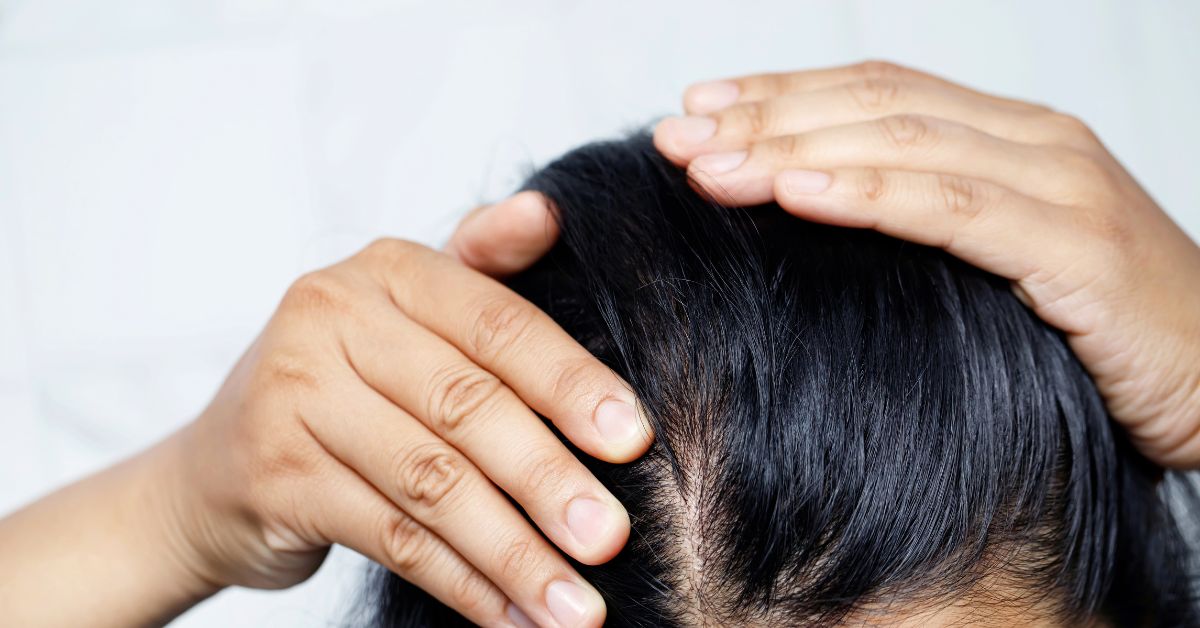This article includes affiliate links, which means I might receive a commission if you decide to buy something through them. It won’t cost you anything, but your support helps me keep creating helpful content like this. Thank you!
Hair loss can be stressful, but the good news is that nature provides us with incredible herbal remedies that can help manage and reduce hair loss naturally. Herbs have been traditionally used to address hair issues, from fortifying hair follicles to nourishing the scalp. Let’s delve into some of the most powerful herbal treatments to help you restore your hair’s strength and vitality!

Why Does Hair Loss Happen?
Before delving into remedies, it is essential to identify the root causes of hair loss. Whether it is due to genetics, stress, hormonal imbalances, or nutritional deficiencies, hair loss can stem from various factors. Fortunately, nourishing your scalp with herbs can help tackle these root causes and encourage healthier hair growth.
1. Rosemary Oil: Stimulate Hair Growth
Rosemary oil is renowned for its ability to stimulate hair follicles and encourage hair growth. It enhances blood flow to the scalp, providing essential nutrients to the hair follicles. Some studies have even shown that it can be as effective as certain medical treatments for hair loss.
How to Use It:
Mix a few drops of rosemary oil with a carrier oil like coconut or olive oil. Rub it into your scalp and let it sit for at least 30 minutes before rinsing it out with shampoo.
Try Maple Holistics Pure Rosemary Oil for a high-quality, therapeutic-grade oil that works wonders on your scalp.
2. Aloe Vera: Soothing and Regenerating
Aloe vera is not only great for soothing sunburns but also beneficial for your hair. Its calming properties can alleviate scalp irritation, and its enzymes support hair regeneration and overall health. Aloe vera also helps cleanse the scalp, removing excess oil and dandruff that may be clogging hair follicles.
How to Use It:
Directly apply fresh aloe vera gel to your scalp. Let it sit for 20-30 minutes before rinsing it out with water.
For a pure and organic option, check out Lily of the Desert Aloe Vera Gel, which is perfect for scalp application.
3. Green Tea: Inhibit DHT and Strengthen Your Hair
Green tea is rich in polyphenols and antioxidants that benefit both your health and hair. It is especially noted for its ability to block DHT, the hormone linked to hair follicle shrinkage and hair loss.
How to Use It:
Brew two green tea bags and let the tea cool. Use it as a rinse after shampooing. You can leave it on or rinse it out with water after 10-15 minutes.
If you prefer a convenient option, try OGX Green Tea Fitness Shampoo, which combines green tea and other nutrients to nourish and strengthen your hair.
4. Ginseng: Strengthen Hair Follicles
Ginseng is a powerful herb commonly used in traditional Chinese medicine. It’s known for its ability to strengthen hair follicles and stimulate growth. Ginseng enhances blood circulation, providing more nutrients and oxygen to the scalp, which encourages hair growth and helps reduce hair loss.
How to Use It:
You can use ginseng supplements, but for a topical treatment, mix ginseng powder with water to make a paste. Apply this paste to your scalp, let it sit for around 30 minutes, and then rinse it off.
For an easy alternative, try Nature’s Bounty Ginseng Complex, a supplement that helps support hair health from within.
5. Amla (Indian Gooseberry): Nourish the Scalp
Amla is a nutrient-rich superfood, loaded with vitamin C, antioxidants, and essential fatty acids that enhance hair nourishment and strength. Its antimicrobial properties also help prevent dandruff and scalp infections, which can contribute to hair thinning.
How to Use It:
Mix amla powder with water to make a thick paste. Apply it to your scalp and leave it on for about 30 minutes before washing it out with a mild shampoo.
For premium amla powder, consider Organic Veda Amla Powder. It can be blended into masks or oils for application to your hair.
6. Fenugreek Seeds: Strengthen and Nourish Hair
Fenugreek seeds are rich in proteins and nicotinic acid, both of which are essential for hair health. They strengthen hair shafts, reduce hair thinning, and promote hair growth. Fenugreek also contains lecithin, which hydrates and nourishes the scalp, preventing dryness and dandruff.
How to Use It:
Soak two tablespoons of fenugreek seeds overnight. Grind them into a paste the next morning and apply it to your scalp. Let it sit for 30 minutes, then rinse it out with a gentle shampoo.
Organic Fenugreek Seeds are a great option for hair masks and other beauty treatments.
Bonus Tips for Preventing Hair Loss
In addition to herbal remedies, you can incorporate some additional practices to maintain healthy hair and prevent further loss:
- Follow a Hair-Healthy Diet: Consuming foods high in biotin, zinc, and vitamins E and C is essential for keeping your hair strong and healthy.
- Limit Heat and Chemical Treatments: Over-styling your hair with heat or chemicals can lead to long-term damage. Use heat tools sparingly and opt for natural hairstyles when possible.
- Manage Stress: Stress is a common cause of hair loss. Managing stress through methods like yoga, meditation, or exercise can positively affect your hair health.
- Stay Hydrated: Consuming ample water is crucial for keeping your scalp and hair healthy.
Conclusion
Herbal remedies offer a natural, gentle way to combat hair loss. From the stimulating properties of rosemary oil to the nourishing benefits of amla, these natural solutions can help promote hair growth and reduce thinning. By integrating these remedies into your hair care routine, you can not only prevent hair loss but also promote healthier and thicker hair over time.
FAQs
1. Can these remedies stop hair loss completely?
Although natural remedies can help reduce hair loss and encourage growth, the outcomes can differ based on individual factors such as diet, lifestyle, and genetics.
2. How often should I use these herbal treatments?
Applying them 2-3 times a week should be adequate. Excessive use can cause scalp irritation, so it’s important to find a balance that suits your hair type.
3. Can I combine these remedies?
Yes! For example, you can mix rosemary oil with aloe vera for a double-dose treatment. Just make sure to test small areas of your scalp first to ensure there are no adverse reactions.
4. How long until you see results?
Most people start noticing a difference after a few weeks of consistent use. However, natural remedies require time to show effects, so patience is essential.
5. Is there any side effect to using herbal remedies?
Most herbal remedies are safe for the scalp, but it’s important to do a patch test before using them in large amounts to ensure you don’t have an allergic reaction.


